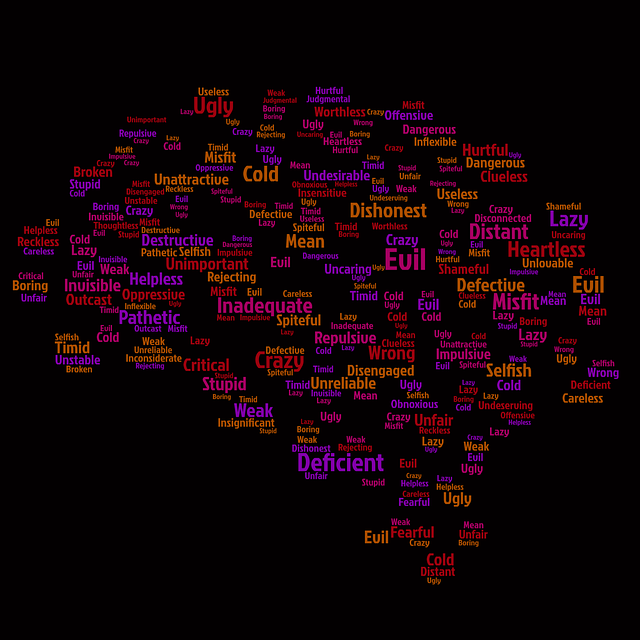Self-recrimination is a common experience for individuals who struggle with mental health issues. This negative self-talk can be detrimental to one’s self-esteem and overall well-being, leading to feelings of guilt, shame, and hopelessness. It can also perpetuate a cycle of unhealthy behaviors or thought patterns.
As a mental health counselor or therapist, it is important to work with clients on identifying and addressing their self-recrimination. Through techniques such as cognitive-behavioral therapy (CBT), mindfulness practices, and self-compassion exercises, individuals can learn how to stop the harmful pattern of negative self-talk and improve their mental health outcomes.
In this article, we will explore various strategies for overcoming self-recrimination in order to promote healthier thinking patterns and increased resilience.
Understanding Self-Recrimination
 Self-recrimination can be an emotionally exhausting experience that leads to feelings of guilt and shame. It is a common psychological phenomenon where one continuously blames themselves for past mistakes or negative outcomes, leading to self-punishment.
Self-recrimination can be an emotionally exhausting experience that leads to feelings of guilt and shame. It is a common psychological phenomenon where one continuously blames themselves for past mistakes or negative outcomes, leading to self-punishment.
The first step in overcoming self-recrimination is recognizing the triggers that lead to this behavior. These triggers could be anything from criticism by others, failure at work or personal relationships, or even physical appearances. Recognizing these triggers can help individuals become more aware of their thought patterns and take steps towards challenging them.
Challenging negative self-talk is another important aspect of stopping self-recrimination. Negative thoughts about oneself such as ‘I am not good enough,’ ‘I always mess up’ only perpetuate the cycle of self-blame and recrimination. It is essential to recognize these negative thoughts and challenge them with positive affirmations such as ‘I am doing my best,’ ‘Mistakes are opportunities for growth.’
Identifying negative thought patterns helps break free from the vicious cycle of self-criticism, paving the way for healthier mental well-being. Identifying triggers and challenging negative thoughts may seem like small steps, but they create a foundation for building resilience against self-recrimination. In the subsequent section, we will explore how identifying negative thought patterns further contributes to breaking free from this destructive pattern of thinking.
Identifying Negative Thought Patterns
Having a negative self-talk can be quite debilitating and may lead to self-recrimination. Overcoming negative self-talk is essential in stopping this vicious cycle of blaming oneself for every mistake or perceived shortcoming. It is vital to recognize that negative thoughts are not facts but rather our own perceptions, which we have the power to change.
Recognizing self-sabotage behaviors is an important step towards overcoming negative self-talk. These could include being overly critical of oneself, constantly comparing oneself with others, or even engaging in activities that harm your emotional wellbeing.
By identifying these behaviors, one can begin challenging them by asking themselves if they are reasonable and rational. Cognitive-behavioral therapy (CBT) techniques offer an effective way of changing the patterns of thinking associated with negative self-talk.
One such technique involves keeping a record of all the situations where you engage in negative self-talk and analyzing their underlying beliefs. This analysis enables one to challenge those beliefs logically and objectively. Another CBT technique that helps overcome negative self-talk involves reframing one’s thoughts positively.
For instance, instead of dwelling on past failures, focus on what you did right and consider it as progress towards achieving your goals. Positive affirmations also help replace negative thoughts with positive ones. Recognizing and addressing negative thought patterns is crucial when dealing with self-recrimination.
Cognitive-behavioral therapy techniques provide practical solutions for individuals struggling with this issue by helping them identify harmful behavior patterns while teaching them how to reframe their thoughts into more constructive ones. With practice, individuals can develop a more positive outlook on life thereby improving their overall mental health and wellbeing.
Cognitive-Behavioral Therapy (Cbt) Techniques
‘Stop beating yourself up, you’re your own worst critic!’
This common figure of speech highlights how self-recrimination can be a barrier to mental well-being. Cognitive-Behavioral Therapy (CBT) techniques are often used by therapists to help individuals overcome negative thought patterns that fuel self-criticism.
CBT focuses on the connection between thoughts, feelings and behaviors; it aims to change irrational or unhelpful thinking processes through cognitive restructuring. One technique commonly used in CBT is positive self-talk. It involves replacing negative self-statements with more encouraging ones. Instead of saying ‘I’m such an idiot for forgetting that,’ try saying ‘It’s okay to make mistakes, I’ll remember next time.’ Positive affirmations gradually replace critical internal dialogue which can increase overall confidence and reduce anxiety levels.
Cognitive restructuring is another technique employed in CBT that helps people challenge their negative beliefs about themselves. By examining evidence against these harmful beliefs, individuals can begin to see alternative perspectives on their situation. For instance, if someone believes they failed because they didn’t study enough, they could reframe this belief by acknowledging other factors outside of their control – like being sick the week before the exam.
Using positive self-talk and cognitive restructuring are two powerful ways to stop self-recrimination. These methods encourage healthy thinking habits that promote resilience and psychological growth.
In addition to CBT techniques, mindfulness practices have been shown to benefit those struggling with excessive guilt and shame. The subsequent section will explore various mindfulness exercises that aim at promoting emotional regulation while providing tools for overcoming self-critical thoughts.
Mindfulness Practices For Overcoming Self-Recrimination
Mindfulness can be a helpful tool in overcoming self-recrimination.
One mindfulness practice that can help is mindful breathing, which involves focusing on the sensation of breathing in and out. This practice helps individuals become aware of their thoughts and feelings without judgment or criticism, allowing them to observe negative thought patterns related to self-blame and shame. By staying present with the breath, they can learn to let go of these unhelpful thoughts.
Another effective technique is engaging in self-reflection exercises such as journaling or meditation. These practices allow individuals to explore the root causes of their self-criticism and gain insight into how it affects them emotionally and behaviorally. Through this process, they can identify triggers that often lead to negative thinking patterns and develop strategies for responding more positively when faced with these triggers.
In addition to these techniques, it’s important for individuals struggling with self-recrimination to cultivate self-compassion. This involves treating oneself with kindness, understanding, and forgiveness rather than harsh judgment or punishment. With regular practice of mindfulness and reflection exercises, individuals can begin to recognize their inherent worthiness and develop greater compassion toward themselves.
Moving forward from here requires continued effort towards developing healthy habits centered around positive affirmations regarding one’s own abilities instead of being critical about shortcomings; seeking support from loved ones during difficult times when dealing with emotional distress so that you do not have any difficulty managing emotions alone; practicing gratitude by finding things daily that make life enjoyable like spending time with friends/family members who are supportive because often times we don’t realize just how much people appreciate us until after something bad happens!
Finally moving away from negativity will take some work but cultivating an attitude shift towards positivity can have lasting benefits on mental health over time if practiced regularly. Making a conscious effort to focus on the good things in life, practicing gratitude, and surrounding oneself with positive people and experiences can lead to increased happiness, reduced stress, and improved overall well-being. It may be challenging at first, but with dedication and persistence, choosing positivity can become a habit and a way of life.
Cultivating Self-Compassion
Imagine that you have made a mistake at work, and it has resulted in some negative consequences. You might feel ashamed or embarrassed about what happened, and begin to engage in self-recrimination, criticizing yourself for not being more careful or competent. However, these kinds of thoughts can be harmful to your mental health and wellbeing, leading to feelings of depression, anxiety, and low self-esteem.
To counteract this tendency towards self-judgment, one important strategy is to cultivate self-compassion. This involves treating ourselves with the same kindness and understanding that we would offer to a good friend who was going through a difficult time. Instead of berating ourselves for our mistakes or flaws, we can practice self-kindness by acknowledging our humanity and imperfections.
Another way to promote self-compassion is through practicing self-forgiveness. This means recognizing that everyone makes mistakes from time to time and accepting ourselves despite our shortcomings. It also involves letting go of any grudges we might hold against ourselves for past actions or decisions. By forgiving ourselves for our errors or missteps, we can move forward with greater clarity and ease.
Here are three ways to start cultivating greater self-compassion:
1. Write yourself a letter of forgiveness: Sit down with pen and paper (or open up a blank document on your computer) and write out all the things you want to say to yourself in order to forgive yourself fully for whatever mistake you made.
2. Practice mindfulness meditation: Set aside 10-15 minutes each day to sit quietly and focus on your breath. As thoughts arise—especially those related to self-criticism—simply acknowledge them without judgment before returning your attention back to your breath.
3. Engage in positive affirmations: Each morning when you wake up—or whenever you find yourself slipping into negative thought patterns throughout the day—make an effort to repeat positive statements about yourself such as ‘I am worthy of love and respect’ or ‘I am doing the best I can with what I have.’
In order to build resilience, it is essential that we learn how to be kinder and more forgiving towards ourselves. By practicing self-compassion on a regular basis, we can begin to break free from negative patterns of thought and cultivate greater emotional wellbeing.
Building Resilience
Cultivating self-compassion is an important step in preventing self-recrimination. By treating yourself with the same kindness, concern, and understanding that you would offer to a good friend, you can develop resilience when faced with difficult situations or challenging emotions.
One way to cultivate self-compassion is through positive self-talk. This involves replacing negative thoughts with kinder and more supportive ones.
Another useful technique for stopping self-recrimination is emotional regulation. When we experience intense or overwhelming feelings, it’s easy to become critical of ourselves. However, by learning how to manage our emotions effectively, we can prevent this from happening. Emotional regulation techniques might include mindfulness meditation or deep breathing exercises.
Maintaining positive mental health outcomes requires ongoing effort and attention. While cultivating self-compassion and practicing emotional regulation are crucial steps towards reducing self-blame and criticism, they are not a one-time fix.
It’s essential to continue using these techniques regularly and making them part of your daily routine in order to maintain their benefits over time.
Overall, developing strategies such as positive self-talk and emotional regulation can help us stop the cycle of self-recrimination before it begins. By committing to maintaining these practices over time, we can build greater resilience against future challenges while also promoting better mental health outcomes overall.
Maintaining Positive Mental Health Outcomes
It is crucial to maintain positive mental health outcomes, especially when dealing with self-recrimination. The negative thoughts that come with self-blame can lead to a downward spiral of low mood and anxiety. However, there are several techniques you can use to help stay mentally healthy.
Firstly, daily affirmations can be beneficial in stopping negative self-talk. It involves repeating positive statements about yourself every day. This technique helps rewire your brain from focusing on the negatives to seeing the positives in yourself. For example, saying ‘I am worthy of love and respect’ or ‘I am capable of achieving my goals.’
Regular practice of daily affirmations can improve your self-esteem and reduce feelings of guilt and shame.
Another effective method for maintaining positive mental health outcomes is gratitude journaling. By writing down what you’re thankful for each day, you shift your focus away from negativity towards positivity. Gratitude journaling has been found to increase happiness levels and reduce stress by promoting an optimistic outlook on life. People who regularly engage in this activity tend to have better sleep quality and improved overall well-being.
Practicing daily affirmations and gratitude journaling can help stop self-recrimination and promote positive mental health outcomes. These simple yet powerful techniques encourage you to replace negative thoughts with more positive ones while increasing self-awareness and mindfulness. Remember that change takes time but consistently incorporating these practices into your routine will bring long-lasting benefits to your emotional well-being.
Frequently Asked Questions
What Is The Difference Between Self-Recrimination And Self-Doubt?
Self-recrimination and self-doubt are two intertwined yet distinct concepts that can significantly impact one’s mental well-being. Self-recrimination refers to intense feelings of guilt, shame, or blame towards oneself for past mistakes or failures.
In contrast, self-doubt is a pervasive sense of uncertainty about one’s abilities or worthiness. Both these negative thought patterns have various causes and consequences ranging from low self-esteem to depression and anxiety.
However, coping strategies and techniques differ depending on the specific issue at hand. For instance, addressing self-doubt may involve challenging irrational beliefs through cognitive-behavioral therapy, while overcoming self-recrimination may require practicing forgiveness and compassion towards oneself.
Mental health counselors and therapists can help individuals identify their unique triggers for negative thinking patterns to develop personalized coping mechanisms that promote self-acceptance and positive growth.
How Do You Know If You Need Professional Help To Overcome Self-Recrimination?
Individuals experiencing self-recrimination may find it difficult to distinguish between normal feelings of guilt and shame versus excessive, ongoing criticism towards themselves.
Signs of self recrimination can manifest as a persistent negative internal dialogue, difficulty forgiving oneself for past mistakes or failures, and an overwhelming sense of worthlessness or inadequacy.
Coping strategies for self recrimination may include mindfulness techniques, cognitive-behavioral therapy, and support from trusted individuals such as friends, family members, or mental health professionals.
Seeking professional help is recommended when one’s ability to function in daily life becomes impaired by their negative thoughts and emotions. A trained therapist can assist with identifying underlying issues contributing to self-criticism and provide guidance on developing healthier coping mechanisms.
Can Medication Be Used To Treat Self-Recrimination?
Medications can be used to treat a variety of mental health conditions, including depression and anxiety. However, when it comes to self-recrimination, medication alone may not be enough.
It is important to also consider therapy as part of the treatment plan. Therapy can help individuals identify negative thought patterns and develop coping strategies to manage them.
While medication can alleviate symptoms such as low mood or excessive worry, therapy provides an opportunity for individuals to work through underlying issues that contribute to self-recrimination.
Ultimately, a combination of both medication and therapy may provide the most effective approach in treating self-recrimination.
How Long Does It Take To Overcome Self-Recrimination?
The journey to overcoming self-recrimination is not a linear process, and the amount of time it takes varies from person to person.
Ways to cope with this negative thought pattern include practicing mindfulness, seeking professional help, and surrounding oneself with supportive individuals.
Self-compassion plays an important role in this process as it allows individuals to acknowledge their mistakes without assigning blame or shame.
As a mental health counselor or therapist, it is essential to provide clients with tools that empower them to break free from patterns of self-blame and cultivate a more positive sense of self-worth over time.
Remember, progress may be slow but it’s always possible – as the old adage goes: ‘Rome wasn’t built in a day.’
Is Self-Recrimination A Sign Of A Personality Disorder?
Self-recrimination can be a common symptom of certain personality disorders, such as borderline personality disorder and obsessive-compulsive personality disorder. Individuals with these conditions may experience intense feelings of guilt and shame, leading to excessive self-blame for perceived mistakes or shortcomings.
While it is not necessarily indicative of a personality disorder on its own, ongoing self-criticism and negative self-talk can contribute to the development or exacerbation of various mental health issues.
Treatment typically involves therapy aimed at addressing underlying psychological factors contributing to the behavior, along with developing coping strategies to manage the intrusive thoughts associated with self-blame.
Self-recrimination is a common experience that many individuals face at some point in their lives. It can be difficult to distinguish between self-doubt and self-recrimination, but the latter involves excessive guilt or blame towards oneself for past actions or events.
If you find yourself struggling with self-recrimination regularly, it may be helpful to seek professional help from a mental health counselor or therapist. Medication alone cannot treat self-recrimination; therapy and counseling are necessary to address underlying issues and develop coping strategies.
The length of time it takes to overcome self-recrimination varies depending on individual circumstances, but with consistent effort and support, progress can be made. Self-recrimination is not necessarily indicative of a personality disorder, but seeking an evaluation from a mental health professional can provide clarity about any potential diagnoses.
In conclusion, overcoming self-recrimination requires patience, persistence, and often professional help. While medication may play a role in treatment for certain conditions related to self-blame or guilt, therapy offers valuable tools for addressing negative thought patterns and developing healthy coping mechanisms. Seeking support can lead to healing and growth as individuals learn to let go of unnecessary shame and embrace forgiveness towards themselves.









